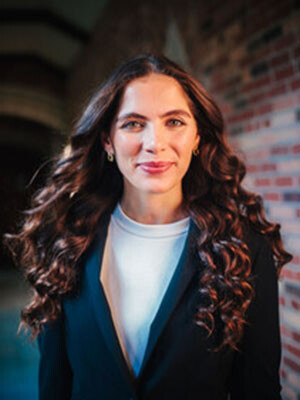Elizabeth Clarke ’23 Asks Why These Conditions Send People Back To Prison


During the past year, Elizabeth Clarke ’23, the Curtis-Liman Clinical Fellow, has been based at the Office of the Federal Public Defender (FDO) for the District of Connecticut and at Yale Law School. Clarke’s fellowship focuses on federal supervised release.
In the federal system, most criminal defendants are sentenced to a term of supervised release that follows their prison sentence. While on supervised release, individuals live in the community and are subject to a series of court-mandated conditions. For example, conditions may require that an individual attend mental health and substance use treatment, submit to a search based on reasonable suspicion (rather than probable cause), complete polygraph testing, refrain from associating with certain people, and much more. Noncompliance can result in additional prison time. Advocates for incarcerated people argue that, especially for individuals with substance abuse and mental health challenges, conditions can be overly burdensome. They note that the system can trap people in a harmful cycle of imprisonment, release, and re-imprisonment.
Clarke discusses her work in this Q&A with the Arthur Liman Center for Public Interest Law.
Why did you choose to be a Curtis-Liman Clinical Fellow at the Office of the Federal Public Defender for the District of Connecticut?
I worked with FDO as a law student in Yale Law School’s Criminal Justice Advocacy Clinic. My clinic team represented a client facing revocation — a return to prison — for allegedly violating his conditions of supervised release. This case sparked my interest in community supervision. I also had a great experience working with the FDO team. When I learned about the Curtis-Liman fellowship, it seemed like the perfect opportunity to explore my growing interest in community supervision and gain hands-on experience as a lawyer representing individuals on supervised release.
Tell us about your project focus.
My work falls into three areas: direct representation, research, and teaching. When working on behalf of clients, I deal with legal issues related to supervised release that arise throughout the lifespan of a criminal case. Judges impose supervised release conditions at sentencing, so part of my work involves contesting overly burdensome or scientifically invalid conditions at the sentencing stage. I also work with clients currently on supervised release to help them navigate conditions-related obstacles. Supervised release conditions frequently require that people secure a job and approved housing. However, individuals returning from prison face various structural barriers that make this extremely difficult. I provide additional support such as helping clients apply for jobs or identifying affordable housing options. An individual accused of violating a condition of supervised release must appear before court at a violation hearing. Individuals facing violation proceedings lack many of the Fifth and Sixth Amendment rights that apply in traditional criminal prosecutions, including the rights to indictment, to a trial by jury, and to be found guilty beyond a reasonable doubt. They do, however, have a right to counsel. I represent clients in these proceedings.
In addition to direct representation work, I lead two research projects focused on supervised release. Hannah Duncan [‘21], the previous Curtis-Liman fellow, created a database of substance use and mental health treatment providers in Connecticut that provide services to formerly incarcerated individuals on community supervision. I have been working with a team at FDO and Yale to build upon Hannah’s important work.
What is the survey you conducted as part of this research?
We recently conducted a statewide survey of treatment providers to better understand the types of services they provide, wait times for services, their capacity to serve non-English speaking individuals or individuals with disabilities, and more. These survey responses will help FDO better serve clients needing treatment. We also used the survey to gather information about how Connecticut’s Section 1115 Demonstration Waiver for Substance Use Treatment has impacted local treatment providers. The Medicaid Institutions for Mental Diseases (IMD) Exclusion is a federal law that prohibits states from using federal Medicaid funds for services provided in mental health institutions with 16 or more beds to patients ages 21 through 64. However, Section 1115 of the Social Security Act allows states to apply for “waivers” of the IMD Exclusion to implement experimental or pilot projects that promote the objectives of the Medicaid program.
In 2022, Connecticut was approved for a Section 1115 waiver to provide expanded Medicaid-funded inpatient and residential services to individuals with substance use disorder. Though the waiver increases treatment options for a population in dire need of services, our survey results show that it has also caused some short-term negative effects. The waiver requires that treatment providers meet certain standards and milestones. In some cases, these new requirements have led to staffing shortages, longer wait times, and shortened treatment durations This type of information can help FDO, and the public, best navigate a period of significant transition in the Connecticut treatment landscape.
What else are you researching?
In another research project, I work with a team of law students to learn about the kinds of conditions imposed when people are sentenced to a term of supervised release. Over the past six months, we have been collecting and analyzing conditions that were imposed by federal judges in a subset of cases in the District of Connecticut in 2023. We aim to use this data to write a paper mapping the types of conditions imposed and, at least within our data sample, the prevalence of certain conditions in our District. Ideally, we want to collaborate with other stakeholders in Connecticut to examine and reconsider the use of some of the most burdensome, and potentially counterproductive, conditions.
Much of this work was inspired by District Judge Stefan Underhill, who has written extensively about the rehabilitative purpose of supervised release and constitutional issues related to revocation. In the long term, this project aims to identify opportunities for change, lessen the challenges of compliance, and increase support for individuals subject to conditions.
Tell us more about the workshop you taught.
As part of my teaching responsibilities, I was a co-instructor for Liman’s spring workshop, Imprisoned: Conception, Construction, Abolition, Alternatives. As a class instructor, I led two class discussions on gender in prison and community supervision. Through this process, I learned how to plan a syllabus, lead fruitful discussions, and distill dense legal materials for a broad audience. As a new attorney, it was incredibly valuable to hear perspectives on the carceral system from people who approach the work from different angles. The Liman workshop is interdisciplinary. Medical doctors helped teach the class, and a group of psychiatrists from Yale School of Medicine’s Forensic Psychiatry program participated each week. The class also included JD students, LLM students, and legal academics — many of whom grew up outside of the United States and provided an international perspective on the criminal legal system and prison reform. The interdisciplinary setting helped us have nuanced discussions about many challenging problems — such as the amount of deference that should be awarded to prison administrators, the appropriate scope of constitutional protections in prison, and the challenge of working to improve prison conditions while also pursuing a decarceration agenda. Hopefully, these discussions pave the way for real solutions.
What were your goals for your fellowship and how are you achieving them?
One of my goals was to forge partnerships between organizations that support formerly incarcerated individuals in Connecticut. The unique nature of my fellowship allows me to build connections between FDO and the Liman Center, which benefits both FDO clients and the Liman community. Natalie Smith, an Equal Justice Works Fellow at the New Haven Legal Assistance Association (NHLAA) and a Yale Law School classmate, contacted me early in my fellowship about setting up a partnership between our offices. We developed a system for referring FDO clients with civil legal issues to NHLAA, which has been very helpful to clients. I also regularly attend New Haven Reentry Court, where defense attorneys, prosecutors, probation officers, treatment providers, and federal judges come together to support individuals reentering the community after incarceration.
Have you had any challenges you weren’t expecting?
Going into this fellowship, I did not expect my work would involve state administrative proceedings. As part of my work with Yale’s Mental Health Justice Clinic, I represented an individual who was wrongfully denied services by the Connecticut Department of Developmental Services (DDS), which is the state agency that supports individuals with intellectual disabilities. In preparation for the proceedings, our team worked with psychology experts to help us understand the science of intellectual assessment. During the hearing itself, I made evidentiary arguments and directed and cross-examined witnesses. Nearly all my legal work to date has been in public defense offices, so it was a challenge to quickly get up to speed on the state administrative hearing process and relevant scientific and legal issues. This experience also deepened my understanding of the obstacles that individuals with disabilities face when trying to access necessary services.
What will be your next role and how has the Fellowship prepared you for it?
I will be clerking for a federal district court judge in my hometown of Philadelphia. Throughout this year, I have had the opportunity to work with amazing supervisors at both FDO and Yale who taught me countless lessons related to oral and written advocacy, effective legal research, building rapport with clients, supervising others, and so much more. Perhaps most importantly, they have shown me what it looks like to remain hopeful and creative in the face of what can feel like insurmountable obstacles. I will be forever grateful for this fellowship, and I am excited to apply my learnings from this year to new challenges ahead.


